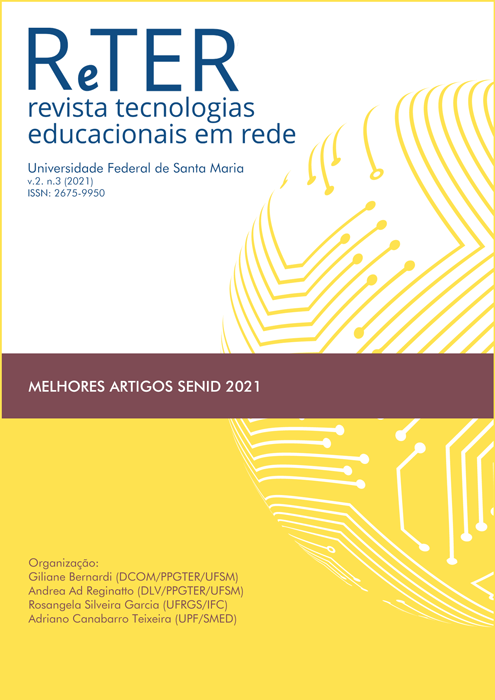EVALUATING A COMPUTATIONAL THINKING FORMATION WITH PLUGED ACTIVITIES CREATED ON SCRATCH
Keywords:
Computational Thinking, Teacher Formation, Scratch.Abstract
This article describes the process of evaluating the knowledge acquired by a group of teachers of Mathematics and Informatics during a training in Computational Thinking using Scratch in order to verify how the group appropriated the knowledge. The training provided program creation activities in Scratch evaluating them quantitatively with the Dr. Scratch. After the teacher training stage, they used the knowledge acquired in classroom training with their students who also developed activities in Scratch and were evaluated with Dr. Scratch. The results obtained demonstrated that the concepts of Computational Thinking that had the highest score for teachers were also the ones that obtained the highest score for students, indicating a direct influence of teachers in the program proposals created by students.
Downloads
References
BECKER, Fernando. Modelos pedagógicos e modelos epistemológicos. Educação e Realidade, Porto Alegre, RS, v. 19, p. 89–96, 01 1999.
BITESIZE. KS3 - Introduction to Computational Thinking. 2015. Publicação online. Disponível em: https://www.bbc.com/bitesize/guides/zp92mp3/revision/1. Acesso em: 10 abr. 2018.
BLIKSTEIN, P. O pensamento computacional e a reinvenção do computador na educacão. 2008. Publicação online. Disponível em: http://www.blikstein.com/paulo/documents/online/olpensamentocomputacional.html. Acesso em: 11 set. 2017.
BRACKMANN, C. P. Desenvolvimento do Pensamento Computacional Através de Atividades Desplugadas na Educação Básica. Tese (Doutorado) — Universidade Federal do Rio Grande do Sul (UFRGS), Porto Alegre - RS, 2017.
CALAO, L. A. et al. Developing mathematical thinking with scratch. In: Design for Teaching and Learning in a Networked World: 10th European Conference on Technology Enhanced Learning, Toledo, Spain, 2015, Proceedings. New York, USA: Springer International Publishing, 2015. p. 17–27.
CURZON, Paul; MCOWAN, Peter W.; PLANT, Nicola; MEAGHER, Laura R. Introducing teachers to computational thinking using unplugged storytelling. In: Proceedings of the 9th Workshop in Primary and Secondary Computing Education. New York, NY, USA: ACM, 2014., p. 89–92. ISBN 9781450332507. Disponível em: https://dl.acm.org/doi/10.1145/2670757.2670767. Acesso em: 26 set. 2018.
DIGITAL Promise. Computational Thinking for a Computational World. 2017. Publicação online.
ELOY, A. A. d. S. et al. Programming literacy: Computational thinking in Brazilian public schools. In: Proceedings of the 2017 Conference on Interaction Designand Children. New York, NY, USA: ACM, 2017. (IDC ’17), p. 439–444. ISBN978-1-4503-4921-5. Disponível em: http://doi.acm.org/10.1145/3078072.3084306. Acesso em: 21 jun. 2018.
FILHO, D. B. F.; JÚNIOR, J. A. da S. Desvendando os mistérios do coeficiente de correlação de pearson (r). Revista Política Hoje, 2009.
GROVER, Shuchi.; PEA, Roy. Computational thinking in k–12: A review of the state of the field. Educational Researcher, Stanford, v. 42, n. 1, p. 38–43, 2013. Disponível em: https://doi.org/10.3102/0013189X12463051. Acesso em: 22 nov. 2017.
KALOGIANNAKIS, M.; PAPADAKIS, S. A proposal for teaching scratchjr programming environment in preservice kindergarten teachers. In: Proceedings of Research, Practice and Collaboration in Science Education - ESERA2017. Dublin City University, 2017. p. 2095–2105. Disponível em: https://www.academia.edu/34914458. Acesso em: 04 jan. 2019.
MIOTTO, P.; CARDOSO, V. C. A utilização do software scratch para o ensino e a aprendizagem do conceito de função. Os Desafios da Escola Pública Paranaense na Perspectiva do Professor PDE, I, 2014.
MORAIS, A. D. d.; BASSO, M. V. d. A.; FAGUNDES, L. A. d. C. Educação Matemática Ciência da Computação na escola: aprender a programar fomenta a aprendizagem de matemática? Ciência Educação (Bauru), scielo, v. 23, p. 455 – 473, 06 2017.
MORENO-LEON, J.; ROBLES, G.; ROMAN-GONZALEZ, M. Dr. scratch: Automatic analysis of scratch projects to assess and foster computational thinking. RED. Revistade Educación a Distancia, Universidad de Murcia, n. 46, p. 1–23, 2015.
MORENO-LEON, Jesus; ROBLES, Gregorio; ROMAN-GONZALEZ, Marcos. Towards data-driven learning paths to develop computational thinking with scratch. IEEE Transactions on Energing Topics in Computing, v. 16, Aug 2017. ISSN 2168-6750. Disponível em: http://ieeexplore.ieee.org/abstract/document/7999170/. Acesso em: 20 dez. 2018.
PAPERT, S. Mindstorms: Children, Computers, and Powerful Ideas. USA: Basic Books, Inc., 1980. ISBN 0465046274.
PRADO, M. E. B. B. Pedagogia de projetos: fundamentos e implicações. 2005.
ROCHA, K. C. da. Programando com o scratch na aula de matemática. Revista RENOTE - Novas Tecnologias na Educação, v. 13, n. 2, p. 1–10, mar 2015.
ROMERO, M.; LEPAGE, A.; LILLE, B. Computational thinking development through creative programming in higher education. International Journal of Educational Technology in Higher Education, v. 14, n. 1, p. 42, Dec 2017. ISSN 2365-9440.
SOUSA-RODRIGUES, C.; LIMA, F.; BARBOSA, F. Importance of using basic statistics adequately in clinical research. Brazilian Journal of Anesthesiology (English Edition), v.67, p. 619–625, 07 2017.
WEINTROP, D. et al. Defining computational thinking for mathematics and science classrooms. Journal of Science Education and Technology, Springer Netherlands, v. 25, n. 1, p. 127–147, 2 2016. ISSN 1059-0145.
WING, J. M. Computational thinking. Commun. ACM, v. 49, n. 3, p. 33–35, mar. 2006.
YADAV, A. et al. Computational thinking in elementary and secondary teacher education. v.14, 03 2014.
Published
How to Cite
Issue
Section
License
Autores que publicam nesta revista concordam com os seguintes termos:
- Autores mantém os direitos autorais e concedem à revista o direito de primeira publicação, com o trabalho simultaneamente licenciado sob a Licença Creative Commons Attribution que permite o compartilhamento do trabalho com reconhecimento da autoria e publicação inicial nesta revista.
- Autores têm autorização para assumir contratos adicionais separadamente, para distribuição não-exclusiva da versão do trabalho publicada nesta revista (ex.: publicar em repositório institucional ou como capítulo de livro), com reconhecimento de autoria e publicação inicial nesta revista.
- Autores têm permissão e são estimulados a publicar e distribuir seu trabalho online (ex.: em repositórios institucionais ou na sua página pessoal) a qualquer ponto antes ou durante o processo editorial, já que isso pode gerar alterações produtivas, bem como aumentar o impacto e a citação do trabalho publicado, com reconhecimento de autoria e publicação inicial nesta revista.










